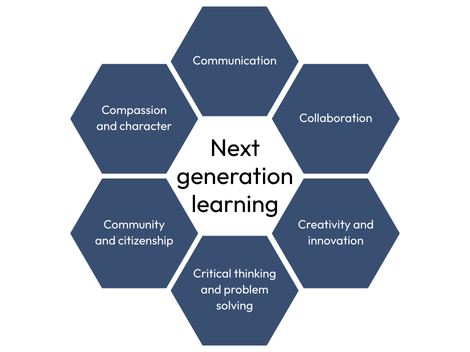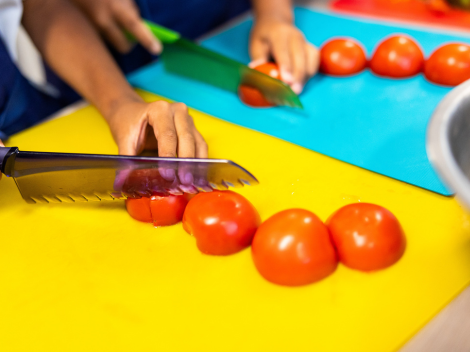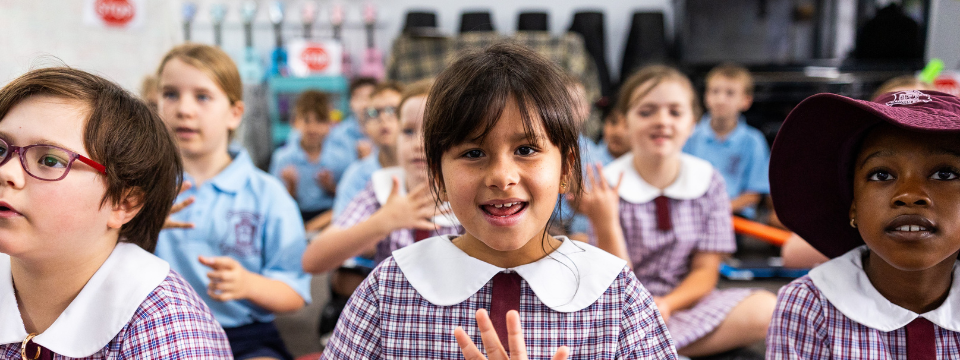We are a vibrant, inclusive and diverse school community. With a supportive and caring environment and a high degree of pastoral care, enrol your child for an enriching K-6 experience.
Our school promotes the development of young leaders, providing big opportunities for real-world learning and academic excellence. We have been helping students achieve academic and social potential while developing creative, critical and innovative thinkers since 1968.
On this page
Unique opportunities
empowering future leaders since 1968
Leadership opportunities
Here at Sts Peter and Paul Primary School, we strive to grow the individual as a leader within the community. Through our evolving Leadership Program, we offer unique opportunities that promote the development of our budding young leaders. This culminates in Year 6, where our students are exposed to our 6 Cs Leadership Model and are given the chance to hone their leadership skills.
Leadership program
At Sts Peter and Paul, we plan a number of exciting opportunities for Years 3 to 6 to challenge and support our students. These opportunities ensure all our students are extended and explicitly support our students to prepare them for the transition to high school. Many opportunities in our leadership program have been in place at Sts Peter and Paul for a number of years, while others have recently been introduced to respond to the needs of our community. Some of the unique opportunities include:
- Corin Forest snow trips
- Team building activities (Treetops Adventure)
- Leading Prayer in classrooms
- Leading a whole school assembly
- Camps (offered for Years 3 to 6).
We aim to give each student every opportunity to grow and flourish as a leader. Enquire to book a tour with our students, meet our principal, and learn more.
The 6 Cs Leadership Model
The 6 Cs framework is integral to our Leadership Program. The framework provides
a holistic approach to education, aimed at developing students’ social, emotional, physical and academic development.

igniting LIFELONG INTEREST IN ROBOTICS
Robotics
Students in Years 3 and 4 participate in the
Robotics Program one day a week. Students are given the opportunity to learn and experiment with programming and problem-solving. Some students enjoy the opportunity to participate in exciting robotics expos that showcase important technological advancements.
Drones
In Year 4, students learn about flying drones. It is a stimulating and engaging way to introduce them to technology, engineering, and problem-solving skills. Drones offer a hands-on learning experience that captures students’ imaginations and curiosity. By using drones in the classroom, students can learn about the principles of flight, the mechanics of drone operation, coding and the importance of safety and responsibility while piloting. Lessons have been designed to teach students how to control drones using remote controllers or apps, using coding to create 2 and 3-dimensional shapes in the air, and even perform simple tasks or challenges. This process fosters creativity and critical thinking and encourages teamwork and collaboration as students work together to complete tasks.
Micro:bits
Using Micro:bits in technology lessons for Year 4 students offers an engaging and hands-on way to introduce the basics of programming and electronics. These tiny programmable computers allow students to experiment with creating simple code that can control sensors, lights, and even small robots. By using a visual programming language like Microsoft’s MakeCode, students can easily drag and drop blocks to build their programs, making coding accessible and fun.
This hands-on experience encourages problem-solving, critical thinking, and creativity as students design projects that range from simple games to more complex interactive devices. Integrating Micro:bits into the curriculum helps demystify technology and fosters a sense of confidence and curiosity about how things work in the digital world, preparing students for more advanced technology challenges in the future.
Virtual reality and augmented reality
In Year 3, students learn about virtual reality (VR) and augmented reality (AR). VR and AR technologies provide students with interactive experiences that can bring abstract concepts to life, allowing them to explore new environments, historical events, or scientific phenomena in a more tangible way. For instance, VR can transport students to ancient civilisations or the depths of the ocean, while AR can overlay digital information onto the real world, enhancing their understanding of subjects like geography or biology.
By integrating VR and AR into the classroom, students can develop critical thinking and problem-solving skills as they interact with these innovative tools. Additionally, these technologies encourage creativity and collaboration, as students can work together to create their own VR or AR content, such as virtual tours or interactive storytelling projects. Teaching about VR and AR in Year 3 not only enhances digital literacy but inspires students to think beyond traditional learning methods, preparing them for a future where technology is increasingly intertwined with everyday life.
mBots
Year 3 students learn about the mBot 2. The mBot robotic vehicle is a fantastic way to introduce them to robotics, coding and STEM concepts. The mBot 2 is a user-friendly educational robot designed to make learning about programming and robotics accessible and enjoyable for young learners. With its intuitive block-based coding platform, students can quickly grasp the basics of coding by dragging and dropping code blocks to create programs that control the mBot 2’s movements and actions.
Through hands-on activities, students explore various challenges, such as navigating mazes, avoiding obstacles, or following lines, which helps to develop their problem-solving and critical-thinking skills. Learning with the mBot 2 fosters creativity, encourages collaboration, and promotes perseverance as students work together to troubleshoot and refine their designs. Introducing the mBot 2 in Year 3 not only cultivates an early interest in technology and engineering but also prepares students for a world where coding and robotics are increasingly integral to everyday life.
LEGO Spike
Teaching Year 5 students about LEGO Spike presents a fantastic opportunity to blend creativity, engineering, and programming in an engaging way. LEGO Spike is an educational kit that combines colourful LEGO building elements with a user-friendly coding platform, making it perfect for introducing students to robotics and computer science. With LEGO Spike, students can build various robots and machines, bringing them to life with motors and sensors.
The block-based coding language, which is intuitive and visually appealing, allows students to program their creations to perform specific tasks, such as moving, sensing the environment, and reacting to stimuli. This hands-on experience helps students develop essential skills like problem-solving, critical thinking, and teamwork as they work collaboratively on projects and solve challenges.
Kitchen Garden Program
Our kitchen garden was created to provide edible, aromatic and beautiful resources for our school kitchen and teach our students about the natural world.
Students develop an appreciation for growing, harvesting, preparing and sharing seasonal produce that uses all the senses. Gardening Club encourages students to help care for our garden and gather and share some fruits and vegetables with the school community.
At Sts Peter and Paul, we have a dedicated and appropriately sized kitchen for children to learn basic kitchen skills. The cooking classes are adjacent to the student-run vegetable garden.
The cooking program is linked closely with the school’s health curriculum, giving children practical cooking experience while following the Australian Healthy Eating Guidelines.
The students enjoy cooking various recipes while learning about healthy eating, teamwork and learning how to use a variety of equipment and utensils in the kitchen. They sit together at the end of each session to eat and share what they have cooked.


Clubs
At Sts Peter and Paul Primary School, we offer various lunchtime and recess clubs:
- Library (reading and games)
- Garden
- Chess
- Choir
- Drums
- Bagpipes
- Drama Llamas (run by Year 6 students)
- DC’s Dancers (run by Year 6 students)
Community involvement
Malkara Special School
We are very fortunate to be located next door to Malkara Special School. Our Year 6 or Year 5 students visit regularly, spending time in classrooms and going for a walk around the neighbourhood with the Malkara students. It is an enriching and fun opportunity, enjoyed by all.

